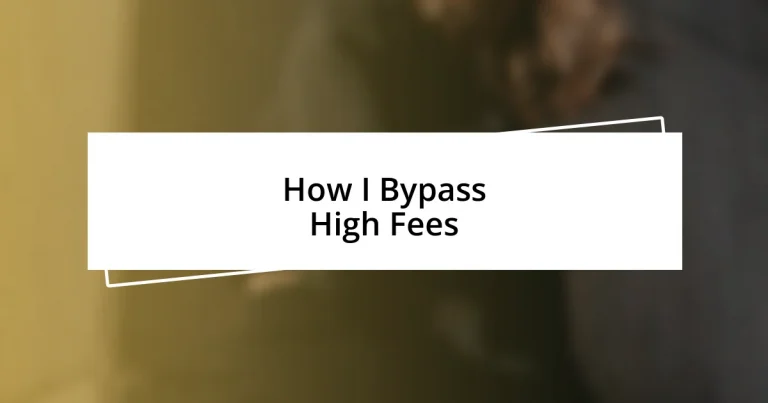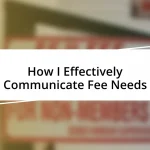Key takeaways:
- High fees can significantly impact personal finances, often hidden in services like subscriptions, money transfers, and bank accounts.
- Exploring alternatives such as peer-to-peer payment apps, online banks, and negotiating with service providers can lead to meaningful savings.
- Utilizing technology, staying informed about fee waivers, and engaging in loyalty programs are effective strategies for avoiding unnecessary charges.

Understanding High Fees
High fees can often feel like a hidden tax on our everyday transactions. I remember feeling frustrated when I discovered that those service charges on my bank account were siphoning away money I thought was safely tucked away. Have you ever sat down and totaled up the costs associated with your financial decisions? It can be eye-opening!
Consider the sticker shock of signing up for a new subscription service. Initially, it all seemed to make sense—until I noticed those sneaky add-ons and administrative fees creeping in each month. It leads me to wonder: are we really getting the value we think we are paying for, or are we just cushioning someone else’s wallet?
It’s essential to dissect where those high fees stem from. Often, they are casually packaged as “convenience costs,” but I’ve learned to look closer. I reflect on my own experiences and how I now often choose alternatives that save me money, despite the allure of convenience. Knowing how these fees are structured allows me to make smarter, more informed decisions.

Common Sources of High Fees
High fees often lurk in unexpected places, catching us off guard. For instance, I’ve personally faced exorbitant charges from money transfer services. I used to rely on a popular service to send funds to friends overseas, only to discover later that they charged up to 7% in fees. That realization made me reevaluate my choices—was convenience worth that extra money?
Another common source of high fees is credit cards. Many people, including myself at one point, overlook interest rates and annual fees when choosing a card. It’s easy to get drawn in by attractive rewards programs but, in practice, they can lead to significant costs if we don’t pay our bills on time. Reflecting on the last time I paid late and watched my credit card company add extra dollars to my balance makes me cringe!
Finally, let’s not forget about account maintenance fees. I used to have a bank account that charged a monthly fee unless I maintained a certain balance. This seemingly minor requirement often led to me juggling my funds, which resulted in the very fee I was trying to avoid. It taught me the importance of reading the fine print before signing up for a service.
| Source | Common Fees |
|---|---|
| Money Transfer Services | Up to 7% of the amount transferred |
| Credit Cards | Interest rates and annual fees |
| Bank Accounts | Monthly maintenance and overdraft fees |

Evaluating Alternatives to High Fees
Evaluating alternatives to high fees involves looking for options that add real value without the unnecessary costs. I recall a time when I was charged hefty fees for transferring money for a family gathering. Frustrated by how much it ate into my budget, I discovered better alternatives. Instead of sticking with the expensive service I had relied on, I switched to an online platform that offered lower rates. The relief I felt when I realized I could save significantly while still getting the job done was quite liberating.
When evaluating alternatives, it’s crucial to consider factors beyond just the fee structure. Here are some alternatives worth exploring:
- Peer-to-Peer Payment Apps: Many apps charge little to no fees for transactions, making them a great alternative for sending money to friends.
- Online Banks: These institutions often offer lower fees for account maintenance and higher interest rates on savings.
- Discount Brokerages: If you’re considering investing, many brokerages have eliminated trade commissions, allowing you to keep more of your gains.
- Negotiate Fees: Sometimes simply asking for a fee waiver or reduction can lead to significant savings, particularly with service providers where you hold multiple accounts.
By keeping an open mind and exploring what’s out there, I’ve come to find that alternatives not only save money but can create a more satisfying financial experience.
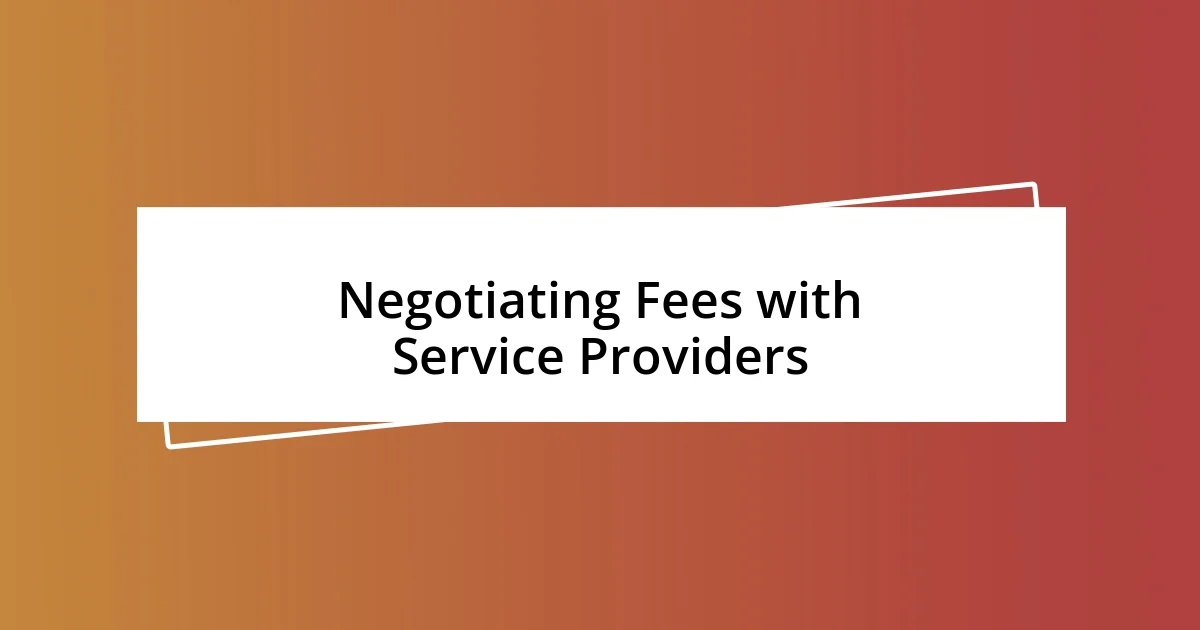
Negotiating Fees with Service Providers
When it comes to negotiating fees with service providers, my experience has shown me that many providers are open to discussions, especially if you come prepared. I remember reaching out to my internet service provider after discovering a competitor offering a better deal. Not only did I express how much I valued their service, but I also mentioned the other offers I had. This honest conversation led to a surprising reduction in my monthly bill—around 15%! Have you ever tried negotiating a bill? You might be amazed at what a simple conversation can achieve.
It’s important to approach negotiations with confidence and a willingness to walk away. There’s this empowering feeling that comes when you assertively communicate your worth as a customer. Once, when my gym raised their membership fees, I took a moment to weigh my options. Rather than accepting the increase, I outlined my loyalty over the years and asked if they could offer a preferential rate. To my delight, not only did they agree to keep my previous rate, but they also offered complimentary personal training sessions for a month! This experience reinforced my belief that providers often have room for flexibility if you ask with the right approach.
In my journey, I’ve learned that timing matters too. For instance, many service providers have yearly promotions or budget cycles that create a perfect opportunity for negotiations. A couple of years back, I noticed my car insurance premium creeping up. I decided to call at the end of the fiscal year and reminded them of my prior loyalty, which paid off. I not only secured a better rate, but they also threw in additional coverage options at no extra cost. The power of negotiating fees lies not just in the potential savings, but in discovering the value of your relationship with service providers. Have you thought about how negotiating might change your spending habits? It’s worth exploring.
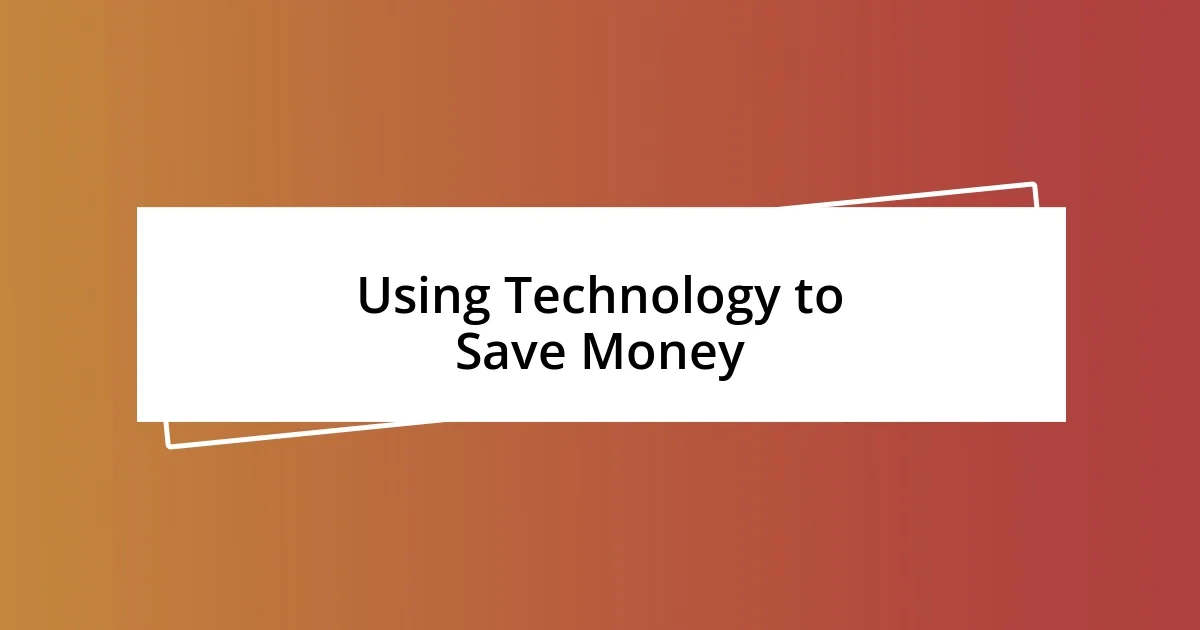
Using Technology to Save Money
Using technology has transformed how I approach saving money, especially when it comes to avoiding high fees. I vividly remember switching from traditional banking to a mobile banking app that promised lower fees and better interest rates. Initially skeptical, I was genuinely impressed with how easy it was to manage my finances and even saw a noticeable boost in my savings. Have you ever considered how your banking technology might be costing you?
Peer-to-peer payment systems have also been a game changer for me. I used to dread splitting bills with friends, knowing there’d be little transaction fees lingering in the background. Now, I rely on an app that allows us to send and receive money instantly with zero fees involved. This has fostered a more relaxed atmosphere when it comes to social outings—no more worrying about costly transactions taking away from our fun! Have you tried cutting out those pesky fees through technology?
Additionally, I’ve found that using budgeting tools online has helped me make more informed financial decisions. By tracking my spending through an app, I’ve gained insights into where my money goes each month. This newfound awareness has equipped me to cut unnecessary expenses, and it genuinely feels empowering. If you haven’t yet explored these tools, why not give them a shot? You might be surprised at the difference it can make!
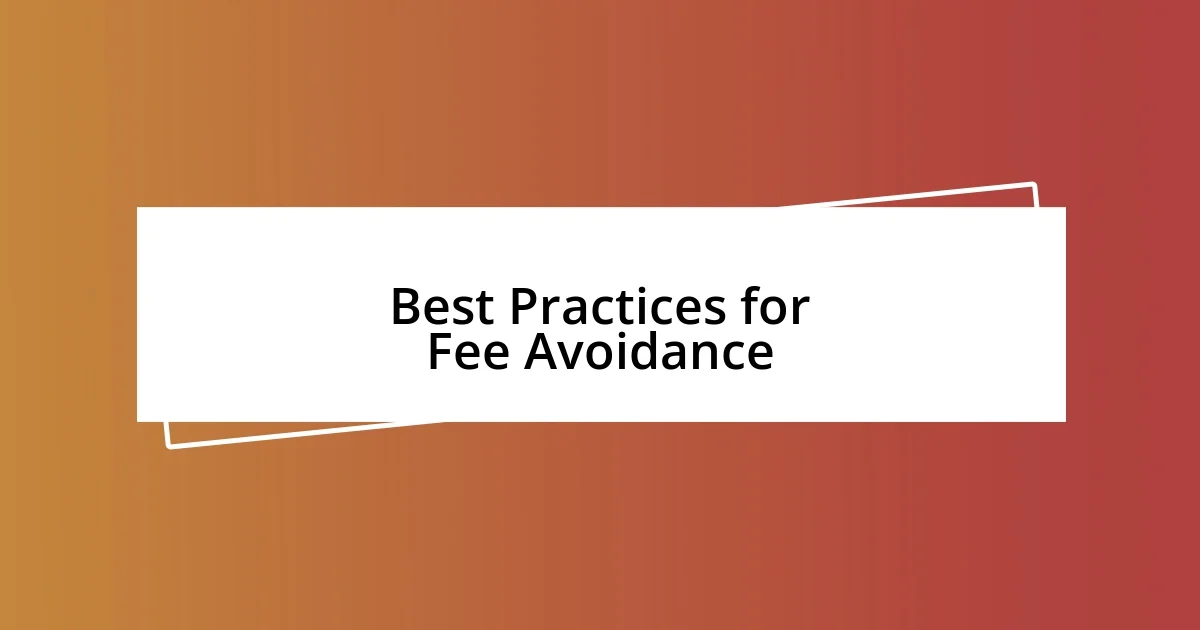
Best Practices for Fee Avoidance
One of the most effective methods I’ve discovered for avoiding fees is simply taking the time to read the fine print before signing up for any service. I remember when I signed up for a subscription that ended up charging an early cancellation fee, which I overlooked in my excitement. It taught me a valuable lesson about awareness—I now make it a personal rule to thoroughly review terms and conditions. How often do you skim through those details? A little diligence can save you a lot of money down the road.
Another strategy I’ve found useful is leveraging loyalty programs. Once, I signed up for a hotel chain’s rewards program during a trip, and soon I was racking up points. Not only did I avoid high booking fees, but I also enjoyed complimentary upgrades on subsequent stays. Think about your spending habits—could establishing a loyalty relationship with a brand benefit you too? It’s like having a friend who rewards you for choosing them consistently.
Lastly, I’ve learned to stay informed about the various ways to waive fees. For example, I recently switched to a credit card that offered no annual fee if you met a minimum spending requirement. I realized that by simply adjusting my purchasing habits, I could dodge fees while enjoying savings. Have you explored your current accounts for opportunities to minimize costs? It’s truly worth investigating.
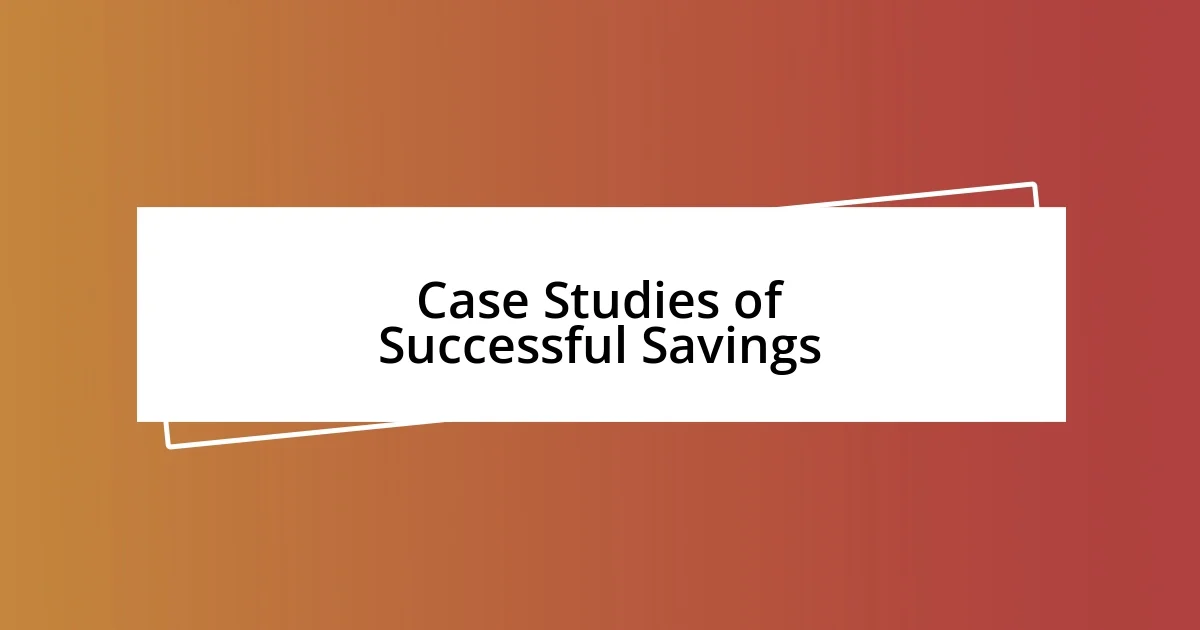
Case Studies of Successful Savings
One of my favorite examples comes from a friend who committed to using only online grocery delivery services that waive delivery fees on certain days. After a few months, she realized that not only did her savings add up, but she also saved time, which she reinvested in her hobbies. Have you ever thought about how much convenience can save you money? It’s fascinating how minor adjustments can lead to significant savings.
Then there’s the story of my cousin, who painstakingly researched investment apps. She found one with no commissions on trades, enabling her to invest small amounts regularly without being bogged down by fees. With consistent contributions over time, she was able to grow her portfolio substantially, much to her surprise. Could you imagine how being fee-conscious can lead to financial empowerment? Her journey serves as a perfect example of how financial savvy can pay off.
Another personal touchpoint is when I decided to attend a few financial literacy workshops. I walked away with tips on how to negotiate fees at my local gym. Surprisingly, after stepping up and asking for a waiver on the sign-up fee, the manager readily agreed. It made me realize that sometimes the simplest of actions can yield significant results. Have you ever tried negotiating your fees? The experience left me feeling more in control of my finances.












